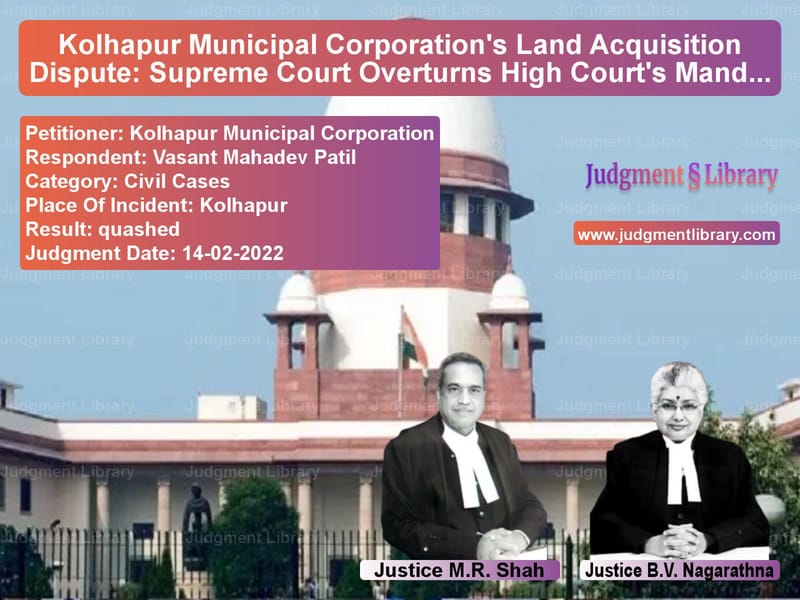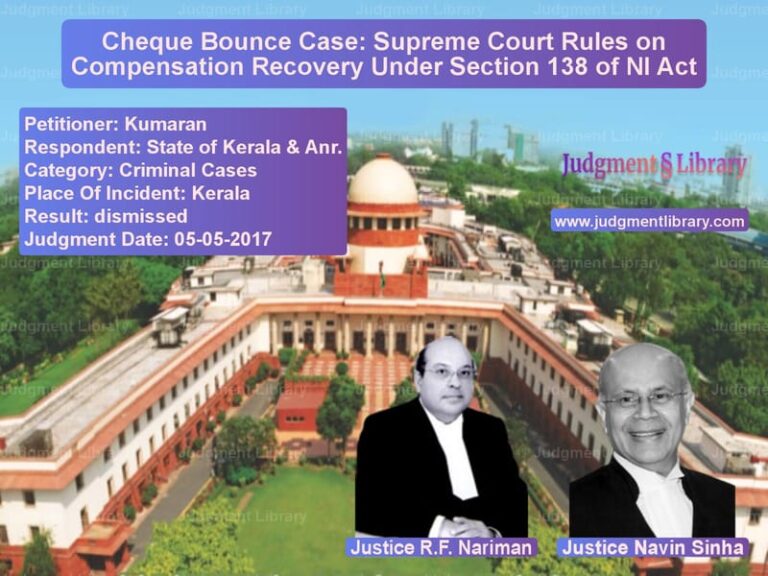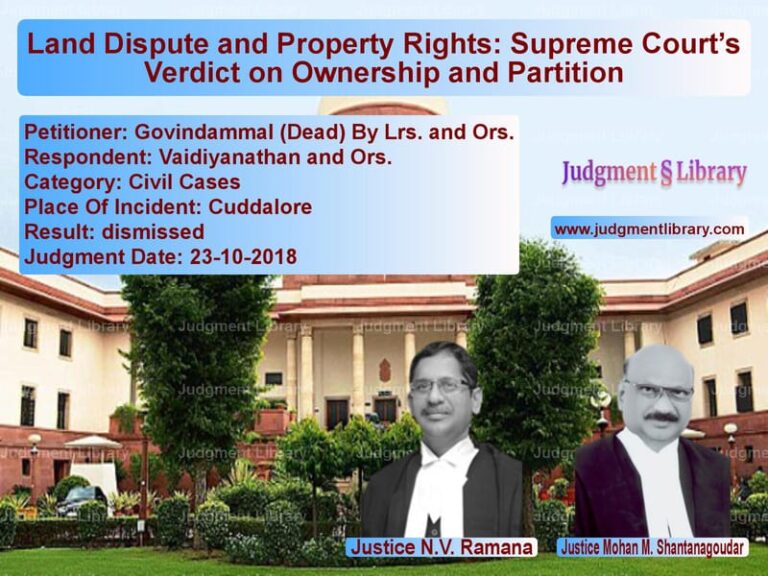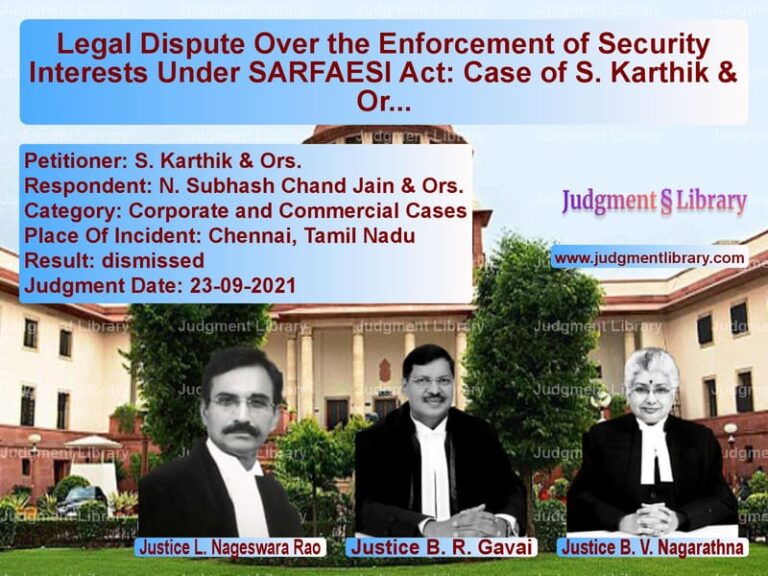Kolhapur Municipal Corporation’s Land Acquisition Dispute: Supreme Court Overturns High Court’s Mandamus Order
The Supreme Court, in its ruling dated February 14, 2022, addressed a dispute involving the Kolhapur Municipal Corporation and landowners concerning the acquisition of land reserved for public purposes under the Maharashtra Regional and Town Planning (MRTP) Act. The Court overturned the High Court’s decision, which had directed the Municipal Corporation to acquire the land and issue a compensation declaration under the Right to Fair Compensation and Transparency in Land Acquisition, Rehabilitation, and Resettlement Act, 2013. The land was located at E Ward, Kolhapur, and had been reserved for public use in the sanctioned development plan but had not been acquired for over ten years, leading to the contention that the reservation had lapsed.
Background of the Case
The dispute arose over land bearing Survey No. 138, measuring 3 hectares and 65 ares, located at E Ward in Kolhapur. The land was reserved in the sanctioned development plan for public purposes such as parking, gardens, and sewage treatment extension. However, despite the land being reserved for over a decade, the Kolhapur Municipal Corporation failed to acquire it. In 2012, after receiving a notice from the landowners under Section 127 of the MRTP Act, the Corporation resolved to acquire the land and submitted a proposal to the state government. However, the land was not acquired due to financial constraints, and the dispute eventually reached the High Court.
In 2018, the High Court ruled in favor of the landowners, directing the Municipal Corporation to acquire the land and issue a compensation declaration under the Act of 2013. The Court’s decision was based on the fact that the land was reserved in the development plan for over ten years, and the Corporation had not made any significant steps toward acquiring it. The Corporation, facing financial difficulties, had initially offered the Transferable Development Rights (TDR) to the landowners as an alternative to compensation, but the landowners rejected this offer. The Kolhapur Municipal Corporation then appealed the decision to the Supreme Court.
Arguments Presented
Petitioner’s (Kolhapur Municipal Corporation) Arguments
The Kolhapur Municipal Corporation’s counsel argued:
- The land reservation had lapsed under Section 127 of the MRTP Act due to the failure of the Corporation to take timely steps for acquisition, as required by law.
- The High Court erroneously issued a writ of mandamus directing the Corporation to acquire the land despite the reservation lapsing by operation of law.
- The land in question was unsuitable and unusable for the reserved public purposes such as parking and gardens due to its location in a flood-affected area.
- The financial constraints of the Corporation made it impossible to pay the compensation amount as prescribed under the Act of 2013, as the compensation amount exceeded the entire annual budget for land acquisition.
- Even if TDR was offered, the landowners had not complied with the necessary conditions, including developing the land for public use.
Respondent’s (Landowners) Arguments
The landowners’ counsel argued:
- The Corporation had initially agreed to acquire the land, and later, it changed its stance, citing financial constraints.
- The landowners had been deprived of the ability to use or develop their land due to the long-standing reservation, and the Corporation’s refusal to acquire the land amounted to a violation of their property rights.
- Although the Corporation proposed TDR in lieu of monetary compensation, the landowners were willing to accept it, provided it was in accordance with the correct rates prescribed by the Development Control Rules.
- The High Court was justified in directing the acquisition of the land as the reservation had not formally lapsed, and the Corporation had shown an intention to acquire the land.
Supreme Court’s Observations
On the Lapse of Land Reservation
The Court held that the reservation for the land had indeed lapsed due to the failure of the Corporation to act within the prescribed time limits set out in Section 127 of the MRTP Act. The Court reiterated the principle that a reservation can be deemed to have lapsed if acquisition proceedings are not initiated within a certain period:
“In view of Section 127 of the MRTP Act, the reservation of the land was deemed to have lapsed as the Corporation failed to take the necessary steps for acquisition within the prescribed time period.”
On the Financial Constraints of the Corporation
The Court acknowledged the Corporation’s financial difficulties but ruled that this could not override the legal obligations regarding land acquisition:
“While the financial constraints faced by the Corporation are acknowledged, they cannot justify the failure to adhere to statutory procedures or the acquisition of land that is deemed necessary for public use.”
On the Suitability of the Land for Public Use
The Court also considered the argument that the land was unsuitable for the purposes for which it was reserved:
“The land in question, being flood-affected and situated in an area that experiences seasonal flooding, is not suitable for the purposes for which it was reserved. The Planning Authority should have assessed the suitability of the land before reserving it for public use.”
Final Judgment
The Supreme Court ruled:
- The reservation of the land for public purposes under the development plan was deemed to have lapsed by operation of law.
- The High Court’s order directing the Municipal Corporation to acquire the land and pay compensation was quashed.
- The Court held that the landowners could not compel the Corporation to acquire land that was unsuitable and unusable for the designated public purposes.
- The Court further rejected the landowners’ plea for TDR, as the reservation had lapsed, and the land was not suitable for public purposes.
Implications of the Judgment
This ruling has significant implications for land acquisition processes in India:
- Landowner Rights: The ruling reinforces the importance of timely action in land acquisition cases and ensures that landowners are not indefinitely deprived of the use of their land.
- Municipal Corporation Accountability: It clarifies that financial constraints cannot justify the failure to follow statutory procedures for land acquisition, and the Municipal Corporation must comply with legal obligations.
- Development Planning: The judgment underscores the need for careful consideration of land suitability before designating land for public purposes, ensuring that reserved land is actually usable and appropriate for the designated public use.
The Supreme Court’s judgment ensures that public sector entities are held accountable for timely acquisition of land and that landowners are compensated fairly for lands reserved for public use, but only when such lands are suitable and required for the purposes intended.
Petitioner Name: Kolhapur Municipal Corporation.Respondent Name: Vasant Mahadev Patil.Judgment By: Justice M.R. Shah, Justice B.V. Nagarathna.Place Of Incident: Kolhapur.Judgment Date: 14-02-2022.
Don’t miss out on the full details! Download the complete judgment in PDF format below and gain valuable insights instantly!
Download Judgment: kolhapur-municipal-c-vs-vasant-mahadev-patil-supreme-court-of-india-judgment-dated-14-02-2022.pdf
Directly Download Judgment: Directly download this Judgment
See all petitions in Contract Disputes
See all petitions in Property Disputes
See all petitions in Environmental Cases
See all petitions in Judgment by Mukeshkumar Rasikbhai Shah
See all petitions in Judgment by B.V. Nagarathna
See all petitions in Quashed
See all petitions in supreme court of India judgments February 2022
See all petitions in 2022 judgments
See all posts in Civil Cases Category
See all allowed petitions in Civil Cases Category
See all Dismissed petitions in Civil Cases Category
See all partially allowed petitions in Civil Cases Category







